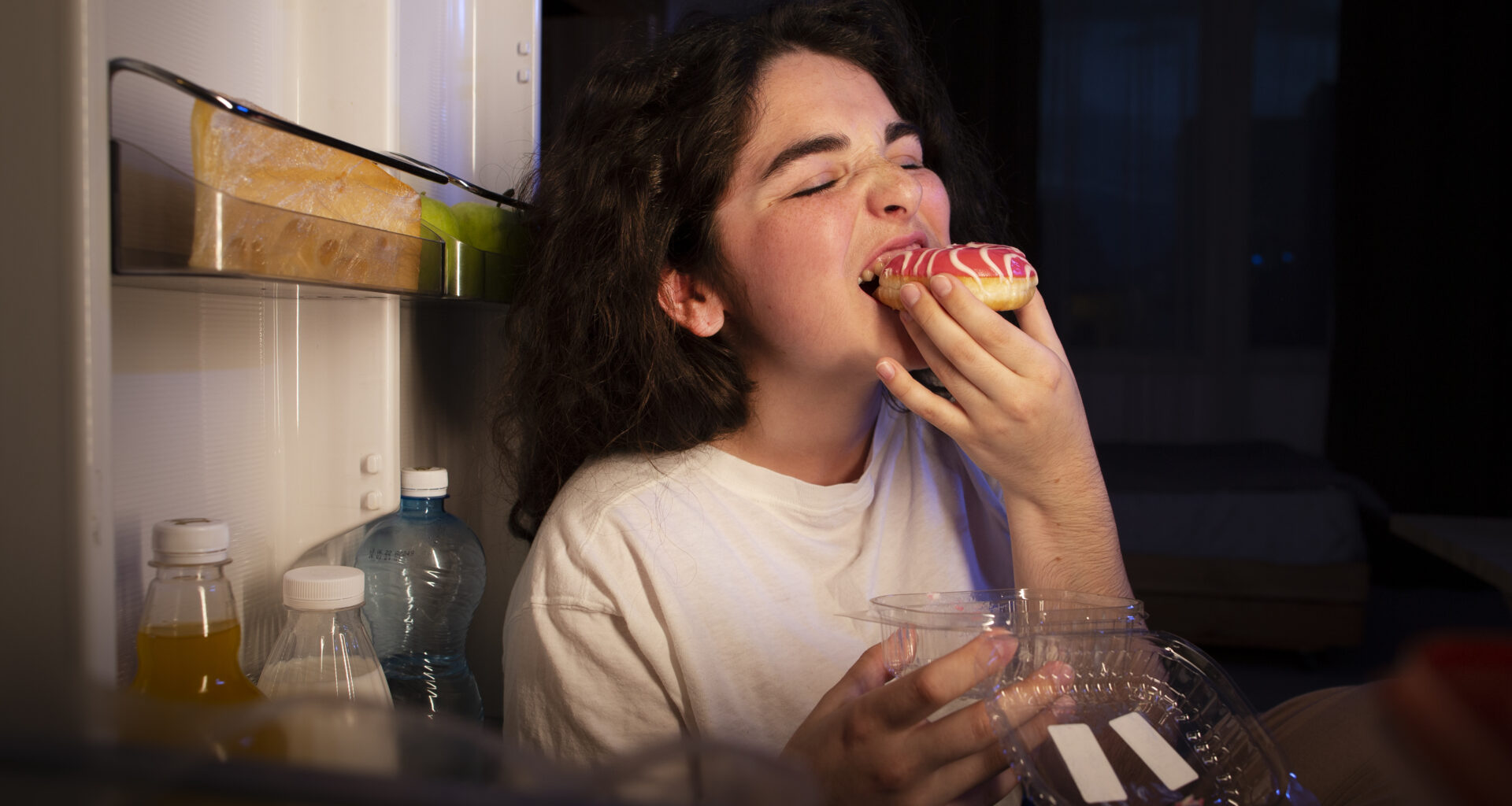Some ways to stop eating so much at night are to plan your snacks ahead of time and watch how much you eat. Using these tips to stop late night snacking can help you break the habit of eating late at night. Read on for more tips on how to stop late night snacking.
Why Do You Need to Stop Late Night Snacking
Anxiety or worry, eating disorders, not getting enough sleep, skipping meals, and behavioural habits that form through repetition are some of the things that can cause late-night cravings. Figuring out these common reasons can help you understand and control your urges to snack at night.
Read More: Social Support and Mental Health
Behavioural Habits
Repetitive actions, like eating ice cream during the night while watching TV, are more prone to develop into habits. To give one example of how habit formation is influenced by consistent actions, eating ice cream immediately after cleaning up can make you feel like snacking.
Disordered Eating
Overeating at night on a regular basis, especially in significant quantities, may be a sign of disordered eating. Night eating syndrome (NES), bulimia nervosa, and binge eating disorder (BED) are a few eating disorders that can lead to binge eating at night. It is advised that you seek professional help if you see these tendencies.
Improper Sleep
Overeating can be exacerbated by inadequate sleep, especially at night. Studies show that people who don’t get the necessary seven or more hours of sleep each night are more prone to eat more frequently, even at night. Making enough sleep a priority could aid in controlling these inclinations.
Skipping Meals
If you skip meals, especially breakfast, your body may not get enough calories, which can make you more likely to feel hungry at night. According to research, this behaviour makes you more likely to snack at night and makes you want carbohydrate-rich foods more. Making sure you eat healthy meals at regular times throughout the day can help you in recovery of how to stop late night snacking.
Stress and Anxiety
When you’re stressed, you might want sweet, salty, or high-fat snacks at night. Stress makes it harder to control your hunger, raises hormones that make you hungry, and increases your desire for comfort foods like sweets. This mix often leads to snacking at night. Finding new ways to deal with stress might help cut down on these cravings.
Read More: Strength Training Vs HITT
Ways To Stop Late Night Snacking
Here are some of the ways to stop late night snacking for weight loss:
Practise Mindful Eating
Make it a habit to wait before eating at night. Know that eating at night can become routine, something you do without giving it much thought. When you want to eat, stop, pause, and just look around for a moment. If you still choose to go to the kitchen later, be more aware as you walk in. Making pauses a regular part of your day can help you break the habit of eating at night.
Stay Hydrated
It’s normal to feel a little hungry before bed, but eating late can mess up your natural sleep processes and make you want sweets again the next day. Instead of grabbing for a snack, put a glass of water next to your bed. When you feel the urge to snack, drinking water can often help quench your hunger and let you know how to stop late night snacking, which can help you sleep better at night.
Read More: Recommended Exercise By Age
Add Eat Protein And Fiber in Every Meal
Simple, processed carbs like french fries and items made with refined wheat (bread, pizza, pasta, pancakes) are common foods in the typical American diet. The problem with these carbohydrates is that they break down quickly, which causes a blood sugar spike and subsequent increase in hunger.
Meal balancing that includes extra protein and fibre slows down the absorption of sugar, which lessens cravings and hunger. Choosing high-protein breakfasts over carb-heavy options like bagels and pancakes, like eggs with avocado, a veggie omelette, or salmon and cheese on whole-grain toast, sets a great tone for the rest of the day.
Maintain Your Blood Sugar
Controlling blood sugar levels is essential for controlling cravings. Sometimes low blood sugar causes desires instead of malnutrition. Focus on eating balanced meals, stop late night snacking, and avoid taking carbohydrates, starches, or sugars on an empty stomach in order to stabilise blood sugar.
Reducing stress, consuming a teaspoon of diluted apple cider vinegar in water prior to meals, and following a particular eating order—saving carbohydrates, starches, and sugar for last—can all aid with blood sugar regulation.
Drink More Fluids
We may mistakenly eat while we are genuinely thirsty due to dehydration’s ability to imitate appetite. Examine your intake of clear fluids for the day before reaching for a snack. When the impulse to snack strikes, try sipping a full glass of water and see if it goes away. Staying properly hydrated can help prevent feelings of fake hunger.
Read More: Choosing Pilates
Conclusion
Many physical and psychological conditions, including dehydration, blood sugar imbalances, and chronic emotional fulfilment, might lead to nighttime eating. It takes time to stop late night snacking. Understanding the fundamental causes of nocturnal snacking is essential to understanding that it not only negatively affects health but also fails to satisfy true requirements.
In order to stop late night snacking habit and strive towards a healthy version of yourself, it’s imperative to prioritise habits like controlling blood sugar, placing an emphasis on protein, drinking plenty of water, and squelching early snack cravings.
FAQs
You might crave late-night snacks due to various reasons such as boredom, habit, stress, or not eating enough during the day.
To satisfy late-night food cravings in a healthier way, try opting for snacks that are high in protein or fiber, such as a small portion of nuts, Greek yogurt, a piece of fruit, or whole-grain crackers with hummus.
Late-night snacking can be bad for you if it leads to consuming excessive calories or unhealthy foods regularly. Eating heavy, high-calorie snacks close to bedtime can disrupt sleep and contribute to weight gain over time.





